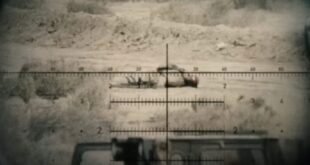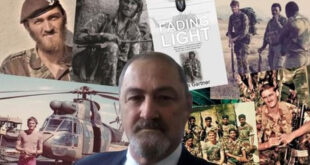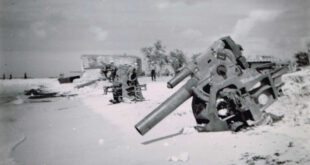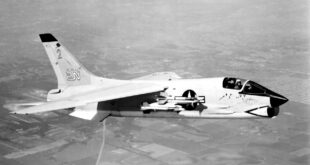
VIDEO Capturing This Mountain Was Key During the Battle of Iwo Jima
THE WARRIOR’S GRAPEVINE Excerpt from VETERANs by Pete Mecca
I heard it through the Warrior’s Grapevine that a veteran of Iwo Jima lived just north of Monticello, GA. Scuttlebutt had it that he’d been on top of Mount Suribachi guarding the famous flag-raisers with his BAR (Browning Automatic Rifle) and that he’d been one of very few Marines from Easy Company that made it off Sulfur Island alive. I gave him a call and set up an interview.
Traveling from Atlanta out I-20 East toward Augusta, I turned right at the Social Circle exit and followed the whiff of cow manure (dozens of cow pastures with thousands of cows flank the highway) then drove past a flat-top boulder called Preacher’s Rock (an enormous rock that wagon train preachers stood upon to spit fire and brimstone down upon immoral trail blazers). Finally I turned right on a county highway about a half mile south of a country-as-corn convenience store that sported one workable gas pump and an inoperable toilet. Inside the store was satisfactorily hygienic considering the outside ambiance.
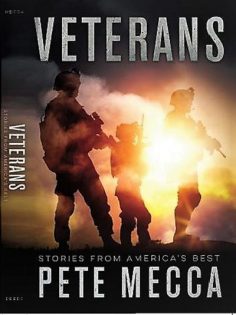
The county highway gave way to a dusty gravel road riddled with potholes from hell. I bounced and bumped but managed to keep my mouth open to avoid chipping any teeth. After about a mile of bone-jarring maneuvering, I finally took a sharp right turn onto the veteran’s property. His rock-strewn driveway was in much better condition than the gravel road and meandered about a quarter mile to a pleasant-looking ranch style house with a workshop out back the size of Trump Tower. A small pond was nearby; the water low, a couple of ducks bitch-quacking due to my early morning intrusion. A flock of grass-fed range-roaming chickens clucked and fussed as I exited my car. As I side-stepped the aftermath of fussy chickens, I heard a rumbling deep-gutted growl.
A whitish bulldog with a head the size of a basketball sat on his haunches directly in front of me. Its rumbling growl faded into a judicious grumble, as if debating a welcome or a funeral.
“Don’t worry ‘bout him,” someone shouted from the back porch. “He ain’t bit nobody in almost a year.”
The less-than reassuring remark came from Gerald Hipps. A willowy fellow, thinning hair, most likely in his late eighties but appeared to be in pretty good shape. Not a tooth in the man’s head; but there was a darn good reason for the lack of choppers.
“Are you Mister Hipps?” I asked.
“Sure am,” he replied. “Com’on in.”
“Uhhh, what about the dog, sir?”
“Bring him in with ya.”
Mrs. June Hipps, an attractive lady with an amiable manner, joined me, the bulldog, and Gerald for the interview. He had not spoken of Iwo Jima until recently. He explained why: “My son and his wife noticed a pickup truck with the bumper sticker ‘Iwo Jima Veteran’, and I thought to myself, well shoot, how come I’m keepin’ my mouth shut. So I decided to start talkin’.”
Only in the last couple of years had he made contact with the nearest field director for the Georgia Department of Veterans Service and agreed to visit the VA Hospital in Atlanta for proper evaluation. Hipps was eventually given disability payments for PTSD. “I was invited to speak at the VFW in Covington,” he said. “Don’t remember much about it, but I guess I did okay. It was a little nerve-rackin’ for me.”
“I’m glad you’re speaking out,” I replied.
“Well, I plan to keep on doin’ so,” he said. “How’d ya find out ‘bout me?”
“We call it the Warrior’s Grapevine.”
“What’s that mean?”
“It means veterans helping other veterans with reverence and empathy without bureaucratic busybodies sticking their noses in our business.”
“I like that,” he replied, nodding his head. “Well, sir, ya ready to do this?”
“Yes, sir, you go right ahead.”
Before he began in earnest, Hipps requested, “I’d greatly appreciate it if you wouldn’t interrupt me while I’m talkin’. I have this thing sorta memorized. It’s the only way I can tell it, if that’s okay with you.”
That was fine with me. Besides, I needed to keep an eye on the bulldog.
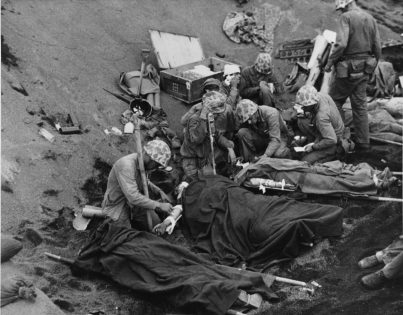
THE MARINE FROM MIAMI
Born into extreme poverty near Miami Beach, Gerald Hipps and his family lived without electricity or indoor plumbing. Steady meals were rare; his mother worked in a laundry; a grandmother raised the siblings; a strawberry was a special treat, as was his first pair of shoes at age 10.
Hipps said, “I was at the movies with a friend when we heard the news about Pearl Harbor, so I joined the Marines.” He did so with his mother’s written permission: Hipps was 16 years old. With a reporting date 3 months away, Hipps found interim employment building PT Boats for the Navy. “I needed to make money for the family,” he said. “But that job didn’t last too long because I got fired.” It seems another worker called Hipps a dirty name. “I sorta beat him up,” Hipps said with a smile.
Although physically tough, Hipps had a discipline problem during basic training at Parris Island. “I was too cocky,” he recalled. “A drill instructor told us to ‘shut-up’ and not say nothin’ while he taught us about weapons, but I asked him, ‘Well, can we smoke?’ so he got a bit angry.” Ordered to put a string around his waist, pick up cigarette butts, then tie the butts around the string, Hipps told the DI he was crazy. In due course Hipps obeyed the order, plus had to do a Hula dance in the process. “I guess that should have taught me lesson,” he confessed. It hadn’t.
Surviving basic training, somewhat, Hipps asked for training as a cook. He stated, “I was sick and tired of being hungry all the time, so learnin’ how to cook made a lot of sense to me.” His cooking career lasted 2 weeks. “The mess sergeant caught me workin’ on my curve ball,” he said, smiling. Apparently the Marines shy away from cooks who practice baseball by throwing Uncle Sam’s peeled potatoes against the mess hall wall. Hipps was sent straight to advanced weapons training.
“I became a BAR (Browning Automatic Rifle) man,” he said. Still too undisciplined according to a DI, Hipps brash behavior culminated in one final punishment: perched atop exposed ceiling beams in the barracks naked as a Jaybird with weapon in hand and singing ‘I’m a gooney bird from Buford.’ “I sorta caught on to the discipline thing after that,” he confessed.
Trained, tough, and reasonably disciplined, Hipps’ next port-of-call was Camp Pendleton, CA for more training before boarding a ship in San Diego. His ship joined an enormous convoy of aircraft carriers, battleships, cruisers, destroyers, troop ships and support vessels, zig-zagging to evade enemy submarines as they crossed the Pacific Ocean. Company E, 2ndBattalion, 28thMarines was eventually ordered below deck to learn their destination. Hipps said, “We gathered around this long table with a mock-up of an ugly little island with an uglier large hill that we had been ordered to take.” The ugly little island was Iwo Jima; the uglier large hill Mount Suribachi.
February 19, 1945 at 0400 – A breakfast of steak and eggs. ‘Eat it up,’ the Marines were told. ‘It may be your last.’ The Japanese propaganda queen, Tokyo Rose, transmitted dismal warnings to the teenagers boarding the LSTs: ‘You sailors and marines on Iwo Jima will die while your wives and girlfriends cheat on you back home. Give up. The Marines are already pushed back into the sea.’ Hipps said, “Shoot, we weren’t even off the ships yet and she was sayin’ we’d already been whipped. She played some pretty good American music though.”
Hipps and Easy Company climbed down rope ladders into landing craft, cautious to keep their hands on the vertical ropes and not the horizontal or the man above would step on and break your fingers. The landing crafts began their deadly gauntlet for the sulfur sands on Iwo Jima. Enemy shells missed some but hit others. Boats and Marines disappeared. Hipps recalled, “That was the really scary part. We kept our heads down but those Navy guys, well, they had to keep their heads up because they were drivin’ the boats. They were very brave men.”
Hipps made the beaches with Easy Company. He recalled the scene vividly. “The beach was awful” he said. “Dead Marines were all over the place and wounded Marines were screaming for a corpsman. It was mass confusion. I heard guys screamin’, ‘Get off the beach, move, move, get off the beach!’ that’s about the time I got hit by shrapnel.”
Wounded and bleeding, Hipps yelled for a corpsman. The hot shrapnel had ripped flesh on his legs, arms, neck, and shoulders. “A corpsman found me almost immediately,” Hipps said. “He put sulfa on the wounds and patched me up pretty good.” The corpsman was John Bradley, one of the six famous flag-raisers and the father of James Bradley, author of the world-acclaimed book and movie directed by Clint Eastwood, Flags of our Fathers. Treated, rested, and determined to achieve his mission, Hipps left the death and suffering on the beach to enter the hell called Iwo Jima.
Lost and separated from the Marines of Easy Company, Hipps skirmished foxhole to foxhole until reunited with his band of brothers scaling Mount Suribachi. “That’s when I found big old Ira,” Hipps said. “I was always behind Ira, even in the chow lines back in the states. He was a great Marine, but a trouble-maker and hell-raiser if he’d been drinkin’ a bit.” American Pima Indian Ira Hayes was one of the famous flag-raisers on Mount Suribachi. Born and raised on the Gila River Indian Reservation in Arizona, he survived the demons of Iwo Jima but lost the battle with his own demons after an all-night game of poker and binge-drinking on Jan. 24, 1955. He was 32 years old.
Hipps and Easy Company took the summit of Suribachi to witness and/or participate in both flag-raisings. “I watched both the photos taken,” Hipps recalled. “The first flag was real small, but when the Marines on the island and all those Navy ships saw the flag all hell broke loose with whistles and cheers and ship horns a blowin’. It was great.”
The second larger and most-recognized flag-raising was virtually a non-episode on Iwo Jima; no bells and whistles, and no ship horns. Award-winning combat photographer Joseph Rosenthal almost missed the celebrated shot, swinging his camera around at the last second to click off a frame. He didn’t even take time to glimpse the image in the viewfinder, yet that 1/400 of a second camera speed snapped the world’s most famous combat photo: The six Marines raising Old Glory on Iwo Jima. And where was Gerald Hipps? He said, “I was standing in the background protecting the guys with my BAR.”
Easy Company was ordered off Mount Suribachi after the flag-raisings. They were told their war was over; they were going home. Hipps said, “We got to the beach and found out things had changed. They turned us around and pointed toward the other end of the island.” Easy Company wasn’t going home; they were entering into a month of hell.
Hipps was in brutal combat at close range, many struggles hand-to-hand. He recalled, “I was fightin’ all the time, a cruel way of fightin’, kill or get killed. The north end of the island was nothing but a killing field.”
MARINES CHARGING THE ENEMY ON IWO JIMA
Daily progress was measured in yards, 100 or 200 yards, many days even less. Hipps recalled, “It was like yesterday; our colonel called some of us into a group, maybe about 20 of us, for a quick briefin’. ” A Japanese grenade dropped right in the middle of them, and exploded. “Most of the guys got killed but I didn’t get a scratch. I was shakin’ like a leaf but the colonel said, ‘Don’t be afraid, son,’ and I remember those words to this day. I loved that guy. He was killed later that afternoon.”
Friends were made, friends were lost. “My best buddy, a fellow named Marino, was sharin’ a foxhole with me,” Hipps said. “He was quite a character, a gamblin’ man, kept loaded dice and a deck of marked cards in his pockets. I really loved the guy, but he stuck his head up to see what was goin’ on and, well, got a bullet right through his head. Those kinda things are tough to forget.”
The marines kept going, kept dying, kept fighting, kept their ‘esprit de corps’ and kept on winning. Hipps stepped on a landmine. “I knew I was a goner,” he said. “It clicked and I waited to meet my maker, but it turned out to be a dud.” Hipps and the remnants of Easy Company made it to the northern end of the island. He said, “I knew the fightin’ was almost over, but I had this horrible feelin’ my luck was runnin’ out. I prayed, ‘God, please let me go home,’ and I still pray to him everyday.”
One hour after his short prayer, Easy Company was relieved by the United States Army. “What was left of us couldn’t believe our good luck, we were still alive,” he said. Easy Company initiated a calculated withdrawal to what should have been a secured airfield. “Nothin’ was secure on Iwo,” he said. Even after the word “secured” entered military history on Iwo Jima, several pilots and crews were butchered in their tents by roving bands of Japanese survivors. Of the probable 21,000 Japanese soldiers on Iwo Jima only 216 were captured or surrendered. The last two Imperial soldiers, Matsudo Linsoki and Yamakage Kufuku, crawled out of a concealed cave and surrendered in 1951.
Hipps talked about the flag-raisers. “Of the six, only three got off the island alive. Old Ira made it, and John Bradley and Rene Gagnon. Harlon Block, Mike Strank, and Frank Sousley were killed on the island, but because of the photo they will live forever in Marine Corps history.” Almost 6,000 Marines lost their lives, 17,000 were wounded, yet the lives of approximately 25,000 American aircrews were saved due to a ‘secured’ Iwo Jima. The young Marines did not die in vain. Gerald Hipps landed on Iwo Jima with 240 of his buddies. He was 1 of 27 that made it off the island.
What remained of Easy Company and Hipps boarded a ship and set sail for home. ‘Home’ meant the Hawaiian Islands to prepare for the upcoming invasion of Japan. Hipps said of the voyage, “I had nightmares on the ship and I still had my BAR with me. One night a marine ran through the door yellin’ from his own nightmares and scared all of us awake. The first thing I saw was the red exit light above the door. In my confused state of mind I recognized the red light as ordnance headin’ in our direction. I grabbed my BAR and almost shot that screamin’ young man; thank the Lord I came to my senses before I pulled the trigger.”
The two atomic bombs nullified the dreaded invasion of Japan. Instead of another invasion, Hipps received orders for Sasebo, Japan to assist gathering Japanese weapons and searching houses for war materials. He said, “The Japanese showed me the utmost respect when I had to search their homes. Several asked me to stay for dinner. The tomatoes were the prettiest I’d ever seen, and very delicious, but had I known their vegetables were fertilized by human manure I would have politely refused to eat them.”
Returning home, Hipps received his honorable discharge in San Diego. The government offered him the equivalent of a year’s salary as part of a severance package. Hipps said, “I refused the money. I didn’t want a dang thing from the government. Iwo Jima and what I witnessed on that island had changed me forever. I bought some civilian clothes and walked over to a YMCA, changed clothes, and left my uniform in the middle of the floor. My war was over, my duty was done, and I was done with it.” Gerald Hipps was 19 years old.
Hipps returned to his mother and grandmother a hardened warrior, with permanent scars on his body and gruesome images of Sulfur Island implanted in his memory forever. For the rest of his life he would fight and endure the battles on Iwo in vivid nightmares and cold sweats. His family knew nothing of his ordeal; his future wife never saw his Marine photo, children and grandchildren and great-grandchildren had never heard his story.
 Soldier of Fortune Magazine The Journal of Professional Adventurers
Soldier of Fortune Magazine The Journal of Professional Adventurers


